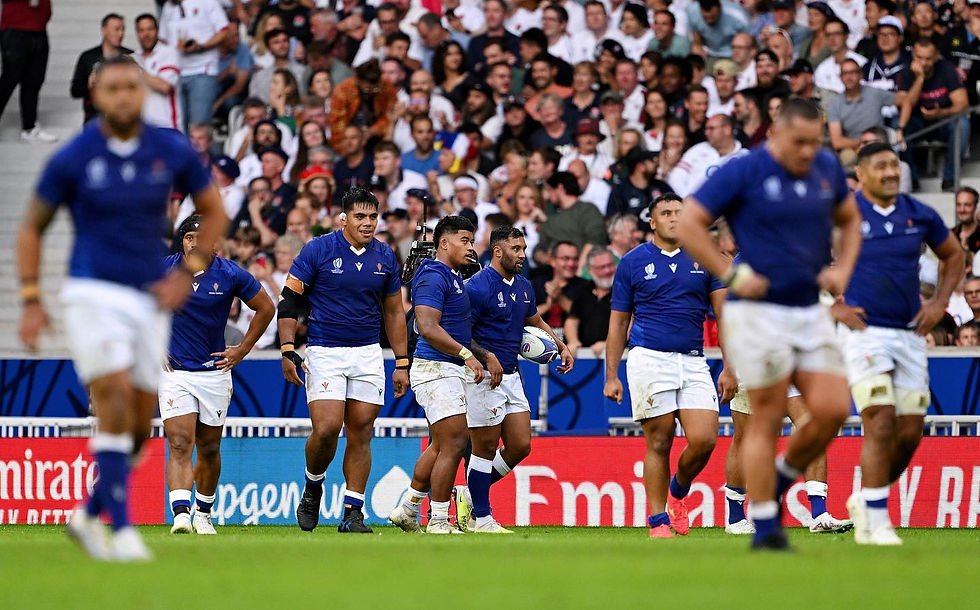"Its not easy but we keep going" Lakapi Samoa CEO discusses efforts to compete Internationally
- Martin Anae
- Jun 8, 2024
- 4 min read

In a recent interview, Lakapi Samoa CEO Faleomavaega Vincent Fepuleai provided an in-depth look into the struggles and strategic plans of Samoa’s rugby teams, highlighting the significant financial hurdles the organisation faces while striving to compete on the international stage.
Faleomavaega Vincent Fepuleai, is also a former Manu Samoa player, earned his first cap against Wales in Cardiff on November 12, 1988, and his final international cap against Romania in Bucharest on October 14, 1989.
Challenges and Disappointments in 2024
Faleomavaega opened up about the difficult year 2024 has been for Lakapi Samoa, especially with the recent disappointing results of the Manu Samoa 7s team. After being winless in the HSBC Madrid Sevens, the team has been relegated from the core teams of the HSBC series, meaning they will miss out on the 2025 series and must return to regional competitions to seek a way back in. This setback has significant financial implications for the union. The Manu Sina 15s (Samoa Women's team) still have a chance to qualify for the Women's Rugby World Cup 2025 in England through a repechage competition in South Africa in September. Meanwhile, the Manu Samoa 15s are in the process of building a new team with qualification for the Rugby World Cup 2025 starting next year.

Preparing for the Olympics Amidst Financial Constraints
Regarding the upcoming Olympics, Faleomavaega stated that the national 7s team, despite recent setbacks, is preparing diligently for the event scheduled from July 26 to August 11, 2024. The current coaching staff and management will remain in place until after the Olympics, at which point a review will be conducted to determine future steps. The financial strain of being out of the HSBC series has forced the union to consider downsizing the 7s program, shifting from a full-time to a campaign mode to align with what the union can afford.
Development Programs and International Player Selection
Addressing the broader development programs within Samoa, Faleomavaega emphasised the extensive efforts behind the scenes. The union manages multiple teams, including the Manu Sina 15s and 7s, Samoa A (Manu Ma), the under-20s, and school-level teams, all under the revenue generated primarily by the Manu Samoa 15s and 7s teams. The development programs are funded by World Rugby and involve numerous competitions and coaching initiatives across primary and secondary schools in both Upolu and Savaii.

Faleomavaega also addressed the misunderstandings surrounding the inclusion of overseas players. The union actively invites overseas talent to join Samoa’s teams, but there have been issues with some players not aligning with the coaches’ expectations and the broader development goals. The partnership with Moana Pasifika and clubs in Europe aims to provide local players with opportunities to play top-level rugby and advance their careers, with the expectation that they represent Samoa when called upon.
He stressed that the union is committed to providing opportunities for local players to play at top levels, including connections with Moana Pasifika and clubs in Europe, to help further their rugby careers. One of the main goals is to find futures for local players while expecting them to represent Samoa when needed.
Financial Transparency and Accountability
Responding to online chatter about financial misuse, Faleomavaega detailed the financial operations of Lakapi Samoa. The union operates on an annual budget of approximately 13 million Tala, with 60% funded by World Rugby and other major donors and 40% from the union itself. Ninety percent of the union’s funding comes from the Manu Samoa 7s and 15s through sponsorships and game fixtures. Additional funding supports development programs and campaigns. Despite the financial constraints, the union ensures player allowances and daily per diems are met, and all financial activities are transparent and accountable to stakeholders. He also noted that this is the first time players have been paid this much.
Comparison with New Zealand Rugby's Expenditure
The financial challenges faced by Lakapi Samoa starkly contrast with New Zealand Rugby (NZR), According to financial reports from NZR, it shows that NZ Rugby operates on a much larger scale. NZR's annual expenditure includes millions in salaries, consultant fees, and operational costs, allowing them to invest heavily in development programs and campaigns. According to the financial statements, NZR's income rose to $271 million, up from $189m the previous year, but its expenditure rose to $318m (up by $135m).
This significant financial muscle enables NZR to sustain top-quality facilities and players, a luxury Lakapi Samoa cannot afford. Despite these limitations, Faleomavaega emphasised that Lakapi Samoa stretches its funds to cover all representative teams and development initiatives, striving to make the most of the limited resources available.

In summary, Lakapi Samoa, under the leadership of CEO Faleomavaega Vincent Fepuleai, continues to face significant financial challenges but remains committed to developing rugby in Samoa. The union’s efforts to balance limited resources while striving for international success highlight the resilience and dedication of everyone involved in Samoan rugby. Despite the setbacks, the focus remains on transparency, accountability, and maximising opportunities for local players to shine on the world stage.



Comentarios